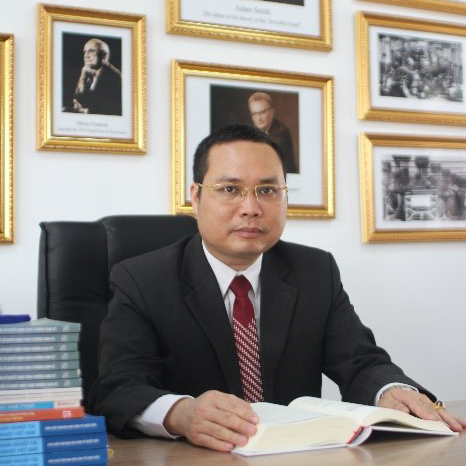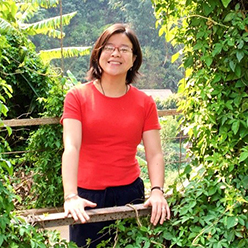Authors: Assoc.Prof.Dr. Nguyen An Thinh, Dr. Pham Thu Thuy (Co-editor)
Cover Type: Paperback
Book size: 16 x 24cm
Price: 890,000 VND
Place of publication: VNU Publishing House
ISBN: 978-604-369-407-9
Trade in agro-forestry products plays a key role in Vietnam's economy and is also an important link in the global value chain of agro-forestry products. However, the value chain and trade of agricultural products are facing competitive challenges in the integration process, and trade barriers when Vietnam signs and ratifies new generation of Free Trade Agreements (FTAs), as well as ecological crises in the long and short term (climate change, acid rain, epidemics, COVID-19 pandemic). To catch up with the world trend and solve the above difficulties, government agencies, donors and scientific research units are making efforts to cooperate in finding and building solutions, mechanisms and policies and techniques to support Vietnam to fulfill its international commitments, respond to domestic and foreign market requirements for agro-forestry products and improve the sustainability of the economy.
In the past 10 years, many groundbreaking new policies to promote the development of the agricultural product industry have been born. Vietnam is also one of the countries in Asia that has received a large number of technical assistance projects for knowledge and technology transfer in the field of agriculture and forestry from many foreign organizations. The development and application of science and technology in agricultural product innovation is also recognized as one of the outstanding achievements of the agricultural sector and a priority of the national socio-economic development programs. However, so far, there are very few scientific publications presenting in-depth research results on theory, policy and practical lessons related to value chain and trade of agricultural products in Vietnam, especially in the context of globalization and ecological crisis.
The editor of the book "Value chain and trade of Vietnam's agricultural and forestry products in the context of international integration and ecological crisis" is Assoc.Prof.Dr. Nguyen An Thinh (University of Economics and Business, VNU) and Dr. Pham Thu Thuy (International Forestry Research Organization - CIFOR) has national and international research experience with deep expertise in development research, natural and environmental economics, political and social sciences climate change policy and sustainable development. The research results presented in this book are the efforts of a collective of authors, including scientists, lecturers, experts, and managers with reputation and experience in the field of agriculture and forestry in Vietnam. The research results aim to provide analytical frameworks, information and data for policy makers and stakeholders in formulating and implementing policies on natural resources and environment and change. climate, promote and support the development of value chains and trade in agricultural and forestry products in the direction of sustainable development.
The content of the book is structured in 4 parts with 40 chapters including: Developmental theories in value chain research, trade in agro-forestry products, international integration and ecological crises challenging development sustainable agriculture (Part 1, including 9 chapters); Potential market for agro-forestry products, national policies and barriers to trade in agro-forestry products (Part 2, including 11 chapters); Sustainable agro-forestry systems and ecological crisis response and resilience (Part 3, consisting of 9 chapters); Experience in developing a number of sustainable national, regional and local agro-forestry product value chains (Part 4, including 11 chapters).
The highlight of the book is to provide readers with up-to-date information on policies and theories of value chain development in the agro-forestry sector being applied in the world, effective multi-sectoral management methods, successful models and lessons learned in value chain development and trade in agro-forestry products on national, regional and local scales with the expectation that successful initiatives can be considered and replicated.
AUTHOR INFORMATION
|
|
Assoc.Prof.Dr. Nguyen An Thinh is currently the Dean of the Faculty of Development Economics, University of Economics and Business, VNU, and holds the position of Vice President of the International Association of Landscape Ecology in Vietnam (VN-IALE). Up to now, he has published 20 domestic and international monographs (of which he co-edited 3 books of Springer Publishing House), more than 100 scientific articles published in domestic specialized journals, more than 100 scientific articles published in specialized journals. 30 scientific articles published in international journals in the list of ISI/SCOPUS. For three consecutive years (2019-2021), Assoc.Prof.Dr. Nguyen An Thinh received a certificate of merit from the President of VNU, commending the excellent scientist for international publication and registration of intellectual property of VNU. |
|
|
Dr. Pham Thu Thuy is a senior scientist at the International Forestry Research Organization (CIFOR). With experience working in more than 17 countries around the world, she is currently the Director of the Global Comparative Research Program on Reducing Emissions from Deforestation and Forest Degradation (REDD) at CIFOR. She is a member of the Editorial Boards of the journals Land Use Science and Forest and Society. Up to now, Dr. Pham Thu Thuy has published about 150 scientific research works in leading scientific journals in the field. In 2016, she was awarded the Certificate of Merit by the Minister of Agriculture and Rural Development for her outstanding important contribution to forestry policy, especially the Policy on Payment for Forest Environmental Services. In 2020, Dr. Pham Thu Thuy and her research team won the award for the best scientific article and the most cited/downloaded by readers around the world by the journal Forest and Society. |
>> >> Click here to see the news in Vietnamese

 Print page
Print page Back page
Back page
